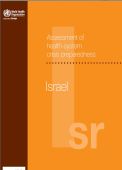Assessment of health-system crisis preparedness: Israel

Download
In 2008, with the support of the European Commission Directorate-General for Health and Consumers, WHO launched the project, “Support to health security, preparedness planning and crisis management in European Union (EU), EU accession and neighbouring countries”, with the aim of improving preparedness for public health emergencies in countries of the WHO European Region. One of the objectives of the project was to test the tool being developed for use in assessing the capacity of health systems for managing crises. This tool, which is based on the WHO health-system framework, was piloted in planning and crisis management assessments carried out in 2007-2008 in Armenia, Azerbaijan and the Republic of Moldova under the joint European Commission-WHO project, “Support to health security and preparedness planning in EU neighbouring countries”. The experience gained in these countries and during a second round of assessments carried out in Poland (2009), Kyrgyzstan (2009), Ukraine (2009) and Kazakhstan (2010) contributed to the finalization of the tool, which has since been used in assessments in Turkey (2010), Croatia (2011) and England (2011). This report describes the level of preparedness of the Israeli health system to deal with crises, regardless of cause. It also examines the risk prevention and mitigation initiatives of the country. While the main focus is on the national level, some attention has been paid to weaknesses in the command structure at the regional level. Recommendations on possible action are included.
This document has been produced with the financial assistance of the European Union. The views expressed herein can in no way be taken to reflect the official opinion of the European Union.



